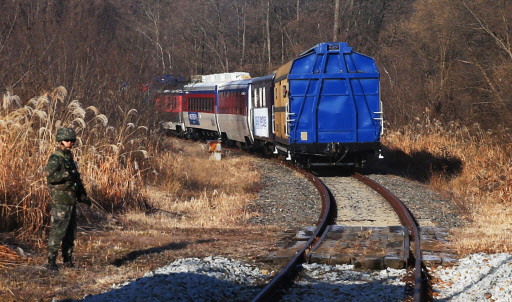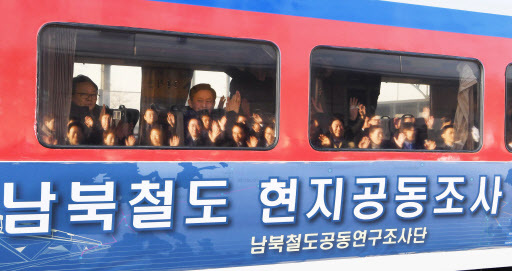Two Koreas launch joint study on inter-Korean railways

SEOUL, Nov 30, 2018, The Korea Herald. A South Korean train crossed into North Korea for the first time in a decade on Friday, as the two countries began an 18-day joint study on cross-border railways, the first step toward modernizing and connecting the Koreas’ railroads, reported The Korea Herald.
A six-car South Korean train departed Seoul Station at around 9:05 a.m. for North Korea’s Panmun Station near the inter-Korean border to carry out the survey, which had been delayed due to US concerns over possible sanctions violations.
The train, which carries dozens of officials and engineers from both Koreas, is set to inspect 1,200 kilometers of railway track in the eastern and western parts of North Korea through Dec. 18. The officials will live and work on the train while the work is going on.
“South and North Korea will together prosper and make peace on the Korean Peninsula more solid by reconnecting the railways into one,” said Unification Minister Cho Myoung-gyon at a sendoff ceremony at Dorasan Station for the study team.
Cho said the government still plans to hold a groundbreaking ceremony this year for the inter-Korean railway and road connection projects, which the leaders of the two Koreas committed to at the April 27 summit.
How will it be done?
Once the South Korean train arrives at the North’s Panmun Station, a North Korean locomotive will take over the South’s six-car train and the South Korean locomotive will return home.
The train will run on the 400-km Gyeongui Line railway, which connects Kaesong to Sinuiju, a city near the Chinese border on the country’s western side, from Friday through Dec. 5. The train will then travel to the North’s eastern coastal city of Wonsan. A 10-day inspection of the 800-km Donghae Line railway from Kumgangsan to the Tumen River will continue from Dec. 8 through Dec. 17, according to the ministry.
The train’s six cars have room for the passengers to cook and sleep, as well as compartments reserved for 55,000 liter of fuel, electricity generators and other equipment.

“Whether the inspection goes well depends on how much North Korean officials show to us,” said Im Jong-il, head of the inspection team and an official from the Ministry of Land, Infrastructure and Transport.
They will look into the conditions of the railroads with the naked eye and will also use a portable device to test their structure, he said.
The last railway inspection was conducted in 2007, when the two Koreas inspected a 412-km railway linking Kaesong with Sinuiju. A South Korean cargo train operated five times a week for about a year until 2008, when inter-Korean relations began to sour over the North’s nuclear ambitions.
Hurdles for the inter-Korean railway connection project
Whether the Koreas can link their railways will depend on the progress of North Korea’s denuclearization, as sanctions against the North prohibit the transfer of oil and other materials, as well as investment in the reclusive country.
Washington maintains that sanctions against North Korea will remain in place until the North achieves complete denuclearization.
The 18-day joint study was made possible only after South Korea received a sanctions exemption from the United Nations Security Council with the support of the US.
In the process, Seoul and Washington created a working group to better coordinate their approach to Pyongyang amid speculation of a rift between the allies over the pace of inter-Korean developments.
The sanctions exemption, however, only covers the field study, which means South Korea will have to seek further exemptions if the two sides are to reconnect the railways and roads.
Marc Knapper, acting deputy assistant secretary at the US State Department, told reporters in Seoul on Thursday that the joint study was only a study.
The railway project cannot proceed further without significant lifting of sanctions against North Korea, steps the US and the international community are not ready to take until the North’s final, fully verified denuclearization, he said.
The inter-Korean railway connection is central to South Korean President Moon Jae-in’s push to expand inter-Korean exchanges, which he believes could encourage the North to give up its nuclear weapons program.
“We will closely consult with relevant countries to make sure the inter-Korean railway connection project can proceed with the support of the international community,” Unification Minister Cho said.
The US and North Korea are still in negotiations over denuclearization, but have been at loggerheads over who should act first. North Korea demands that the US ease the sanctions, but the US wants the communist state first to take irreversible steps to denuclearize.
The US has requested that North Korea reschedule the canceled high-level meeting between Secretary of State Mike Pompeo and his North Korean counterpart, Kim Yong-chol. The US officials have not yet received a response, according to diplomatic sources here.